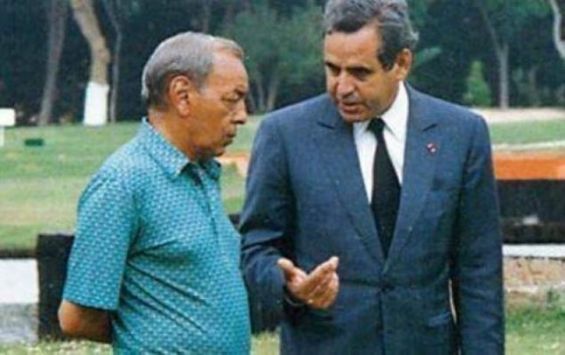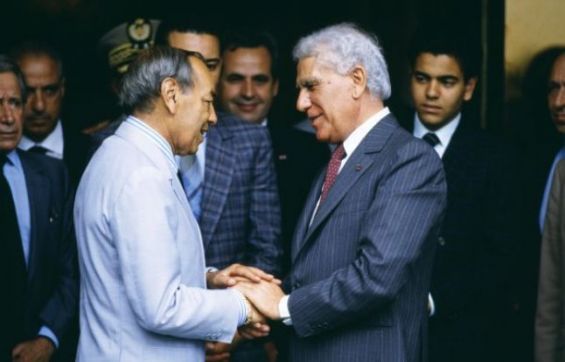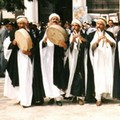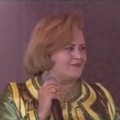While it was building the Sahara sand wall to put an end to the repeated armed assaults of the Polisario, the Kingdom and the Front’s separatists had met several times before the UN managed to call a ceasefire between the two parties in 1991.
However, before 1989, the Kingdom refused to «officially enter into direct negotiations with the Polisario, arguing that Morocco as a State could only held talks with another State». Despite its firm refusal, Morocco held several meetings with members of the separatist movement, one of which was chaired by King Hassan II in Marrakech.
The 80's meetings and the Saudi mediation
Thus, it is at the beginning of the 1980's that Morocco and the Polisario Front met in Riyadh, in the middle of the Sahara war. According to the book «Le conflit du Sahara occidental dans les relations inter-arabes», this meeting took place «under the aegis of King Fahd of Saudi Arabia».

And it was not the first time that Saudi Arabia was trying to play the role of mediator between Morocco and Algeria regarding the regional conflict. In fact, according to an article entitled «The Western Sahara Conflict and Inter-Arab Relations» by Olivier Vergniot, the Wahhabi monarchy «regularly» tried to «fulfill the role of mediator» when it came to this conflict, «such as in November 1976 or in September 1977».
Thanks to King Fahd Abdelaziz Al Saoud, Morocco and Algeria met for the first time on February 26, 1983, then a second time on May 4, 1987 to discuss the situation of the Moroccan-Algerian border in the presence of King Fahd of Saudi Arabia, King Hassan II, and Algerian President Chadli Bendjedid.
But already in 1982, representatives from Morocco and the Polisario Front met in Lisbon, Portugal, and attended informal talks. In an interview with Al Jazeera in 2004, Bachir Mustapha Sayed, the brother of the founder of the separatist movement and current «Minister of Occupied Territories» of the Polisario Front claimed to have met with Driss Basri, Moroccan Interior Minister at the time and close ally to King Hassan II.
«I told him that I wanted to see him, not to inform him of something or convince him of an analysis, but because my heart told me that my meeting with Hassan II will be the factor that will change all the parameters and will lead us to a totally different and new approach», he told Al Jazeera.
Driss Basri would then have tried to know more about his interlocutor but failed. He then would have promised him he would inform the King of Morocco of his request.
A year later, another meeting brought together Moroccans and pro-Polisario Saharawis in Algiers. Bashir Mustapha Sayed recalled that, in the aftermath of the meeting of King Hassan II and President Chadli Benjedid on February 26, 1983, the Algerian authorities informed the Polisario Front of «Saudi Arabia's desire to organize a meeting between Moroccans and Saharawis». «We were afraid because Saudi Arabia was trying to find a bilateral solution between Algeria and Morocco at the detriment of the Saharawi people», he explained.

In Algiers, Morocco was represented by its Foreign Affairs Minister, M'hamed Boucetta, its Interior Minister, Driss Basri and by Ahmed Réda Guédira, adviser to King Hassan II. The meeting concluded without reaching concrete results on the territorial conflict.
From the 1989 meeting to the ceasefire agreement
Meetings between Moroccans and separatists went on. In «Western Sahara: The Challenges of a Regional Conflict», Khadija Mohsen-Finan talks about a meeting that was hosted in Lisbon in 1985. «Meetings» were never «considered as negotiations», qualified «deliberately» by Morocco as «discussions» or «hearings», she added.
It is in January 1989, in Marrakech, that King Hassan II received, four years later, a delegation of the separatist movement. According to Universalis, the two sides talked «about the referendum on self-determination, scheduled for that year in the former Spanish Sahara under the auspices of the UN».
The meeting was followed by «a Polisario communiqué» paying tribute to the «constructive and courageous position» of the King of Morocco during these conversations. But on August 20, the sovereign changed his tactics by explicitly expressing, in his speech, «his desire to rally the 'lost brothers'» of the Polisario.
A year later, on the 17th of January 1990, he received in Marrakech «ten former members of the Polisario Front whom he appointed members of the Royal Advisory Council for Saharan Affairs», including Omar Hadrami who was appointed as a governor at the Interior Ministry and Bachir El Ouali named advisor to the Ministry of Foreign Affairs.

According to Khadija Mohsen-Finan, the meeting in Marrakech (February 1989) between the King and a Polisario delegation showed how the «Polisario’s requirements as well as its war threats were 'meaningless'».
Moreover, on the side of the Polisario, «the meeting of Marrakech, so much requested, was not the act of recognition of the Polisario Front by its opponent», contrary to what was hoped by the friends of the former secretary general of the Front, Mohamed Abdelaziz.
One year later, both parties signed the cease-fire agreement under the auspices of the UN. Although they met in Geneva in 1996 under the aegis of the UN, it is only in June 2007 that Morocco and the Polisario officially met in Manhasset, in the suburbs of New York, for direct negotiations in accordance with UN Security Council Resolutions.





 chargement...
chargement...













